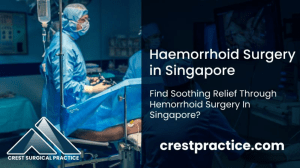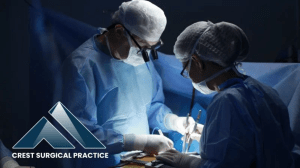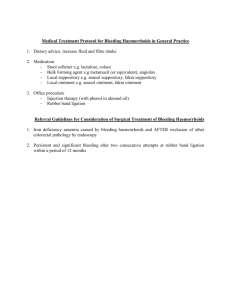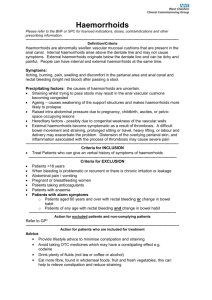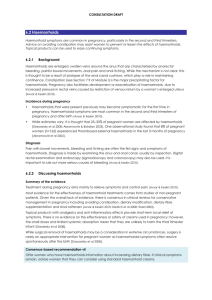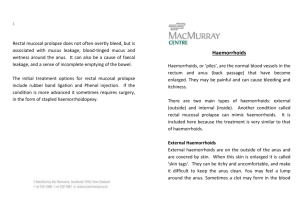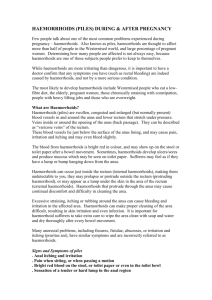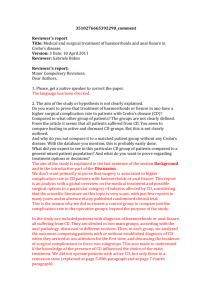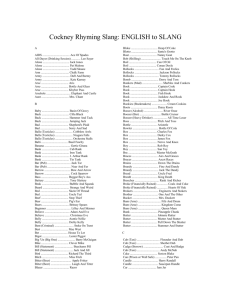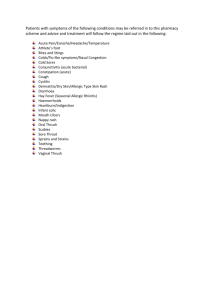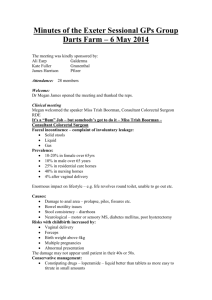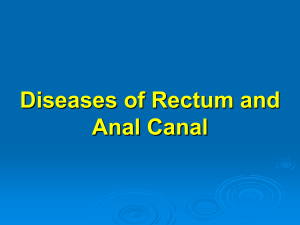Haemorrhoids - NHS Gloucestershire CCG
advertisement
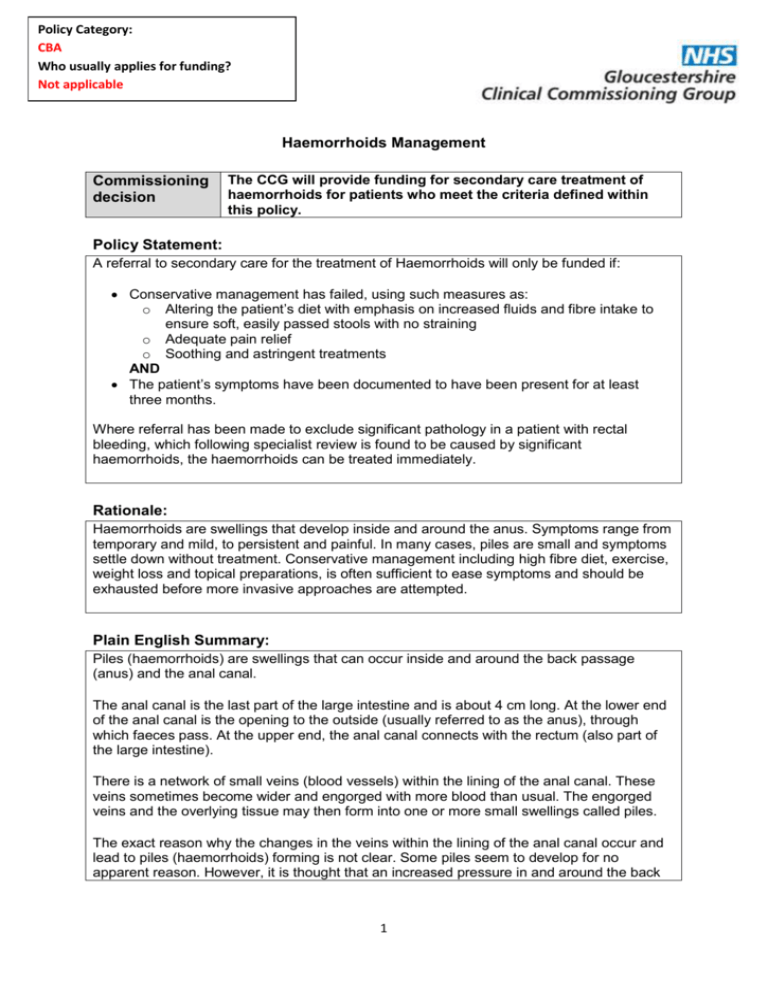
Policy Category: CBA Who usually applies for funding? Not applicable Haemorrhoids Management Commissioning decision The CCG will provide funding for secondary care treatment of haemorrhoids for patients who meet the criteria defined within this policy. Policy Statement: A referral to secondary care for the treatment of Haemorrhoids will only be funded if: Conservative management has failed, using such measures as: o Altering the patient’s diet with emphasis on increased fluids and fibre intake to ensure soft, easily passed stools with no straining o Adequate pain relief o Soothing and astringent treatments AND The patient’s symptoms have been documented to have been present for at least three months. Where referral has been made to exclude significant pathology in a patient with rectal bleeding, which following specialist review is found to be caused by significant haemorrhoids, the haemorrhoids can be treated immediately. Rationale: Haemorrhoids are swellings that develop inside and around the anus. Symptoms range from temporary and mild, to persistent and painful. In many cases, piles are small and symptoms settle down without treatment. Conservative management including high fibre diet, exercise, weight loss and topical preparations, is often sufficient to ease symptoms and should be exhausted before more invasive approaches are attempted. Plain English Summary: Piles (haemorrhoids) are swellings that can occur inside and around the back passage (anus) and the anal canal. The anal canal is the last part of the large intestine and is about 4 cm long. At the lower end of the anal canal is the opening to the outside (usually referred to as the anus), through which faeces pass. At the upper end, the anal canal connects with the rectum (also part of the large intestine). There is a network of small veins (blood vessels) within the lining of the anal canal. These veins sometimes become wider and engorged with more blood than usual. The engorged veins and the overlying tissue may then form into one or more small swellings called piles. The exact reason why the changes in the veins within the lining of the anal canal occur and lead to piles (haemorrhoids) forming is not clear. Some piles seem to develop for no apparent reason. However, it is thought that an increased pressure in and around the back 1 Policy Category: CBA Who usually applies for funding? Not applicable passage (anus) and anal canal can be a major factor in many cases. Symptoms range from temporary and mild, to persistent and painful. In many cases, piles are small and symptoms settle down without treatment. Diet and ointments can often be sufficient to ease symptoms. Where the haemorrhoids are larger with more severe symptoms a procedure known as haemorrhoid banding may be undertaken. This procedure is usually done by a surgeon in an outpatient clinic. A haemorrhoid is grasped by the surgeon with forceps or a suction device. A rubber band is then placed at the base of the haemorrhoid. This cuts off the blood supply to the haemorrhoid which then dies and drops off after a few days. The tissue at the base of the haemorrhoid heals with some scar tissue. In about 8 in 10 cases, the piles are cured by this technique. In about 2 in 10 cases, the piles come back (recur) at some stage. (However, you can have a further banding treatment if this occurs.) Banding does not work in a small number of cases. In these circumstances your doctor may recommend alternative treatment such as surgical haemorrhoidectomy, which involves cutting away the haemorrhoids and is performed under a general anaesthetic. Evidence base: Davies RJ. Haemorrhoids. BMJ Clinical Evidence. April 2006. Available at: http://www.clinicalevidence.com/ceweb/conditions/dsd/0415/0415.jsp Brisinda G. How to treat haemorrhoids. BMJ 2000; 321: 582-3 Link to application form – Not applicable For further information please contact GLCCG.IFR@nhs.net Date of publication Policy review date 1st August 2015 30th June 2016 Consultation Consultee Planned Care Programme Board CCG Governing Body Development Session GHNHSFT (via General Manager/Head of Contracts) GP Membership (via CCG Live/What’s New This Week) Date 31st March 2015 (virtual) 4th June 2015 18/05/2015 – 29/05/2015 06/05/2015 – 05/06/2015 Has the consultation included patient representatives? No Policy sign off Reviewing Body Effective Clinical Commissioning Policy Group Integrated Governance and Quality Committee 2 Date of review 14th April 2015 18th June 2015
